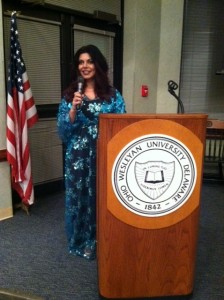
Transcript Correspondent
Kurdish Chef Avesta Saaty cooks with a collage of different herbs, spices and cultures, but emphasizes locally grown and eaten food is best.
On Nov. 1 Saaty spoke about her experience growing up with local organic food and cooked Kurdish food for Ohio Wesleyan students.
Kurdistan consists of parts of Iraq, Iran, Turkey and Syria.
“The closest I have ever been to my land is Lebanon and I will probably never be able to go back so food helps connect me to Kurdistan,” said Saaty.
Saaty grew up in Southeast Ohio with parents who emigrated from Iraq in the 1970’s. She cooked and found her love for delicately homemade food with her mother and her large Kurdish family.
They raised their own chickens, butchered them themselves, grew their own produce and milked their own cows.
“Growing up I never experienced going out to eat nor experienced eating packaged food,” said Saaty. “I just assumed everyone made their own food.”
Saaty said the key ingredients to a healthy life are knowing the importance of eating local and knowing where your food comes from. She said eating non-processed food and her mothers homemade Kurdish yogurt is what made her healthy.
“I always knew what I was eating and where it came from,” said Saaty. “People ask how am I turning 40 and I say its because what I grew up eating and what I eat today.”
Saaty’s Kurdish background made her want to have her own restaurant. She was trained in Western Europe and opened “Avesta Eclectic Cuisine,” in Delaware in 2004.
Saaty had Greek, Turkish, Persian, Arabic, Eastern European and Kurdish foods on the menu for OWU students and Delaware residents. The restaurant is now closed.
Senior Maggie Argiro, who introduced Saaty at the lecture, said a restaurant like Saaty’s would be a great addition to the Delaware Community.
“I would love it if Avesta’s Eclectic Cuisine was still in Delaware today,” said Argiro. “After eating the meal she served us, I have no doubt that the restaurant would be successful today.”
Argiro said a restaurant like Saaty’s would be a good addition to the restaurants on the OWU card.
“But I think any restaurant like Avesta’s Eclectic Cuisine would be a welcomed addition to the options we have in Delaware and for the students,” she said.
Saaty said the Kurds eat based off of Kurdistan’s terrain, such as nuts, pomegranates, cheese, yogurt, fruit and salads.
“The Kurds think that if you start with some type of salad you’ll eat less entrée,” said Saaty. “So Kurds start with some sort of salad and end the meal with some sort of fruit. They believe fruit helps digest your food.”
Saaty cooked dishes of Mediterranean stuffed grape leaves, cucumber yogurt with pita bread, basmati rice, beans and baklava.
She also showed a video about Kurdish people and what the Kurdish people have been through in order to have their own culture and land.
OWU alumna Kath Ziminsky also spoke at the lecture.
“I believe that everyone should be a farmer on some scale,” Ziminsky said. “There is an undeniable satisfaction and sense of freedom that comes from being a producer of homegrown and homemade staples.”
Ziminisky also said people’s food choices have an impact on the economy on both a global and local scale.
“In today’s globalized world it is the consumer who has the power to make a difference in the unbalanced often inhumane so called free-market economy.
“It is now more important for citizens of the world to wake up, put their money literally where their mouth is and be conscientious consumers by eating locally and buying (and thus demanding) organic, fair trade products.”